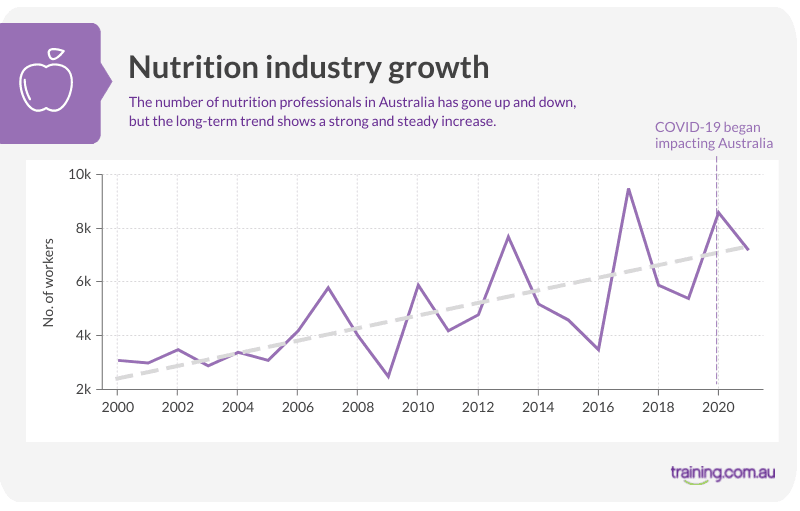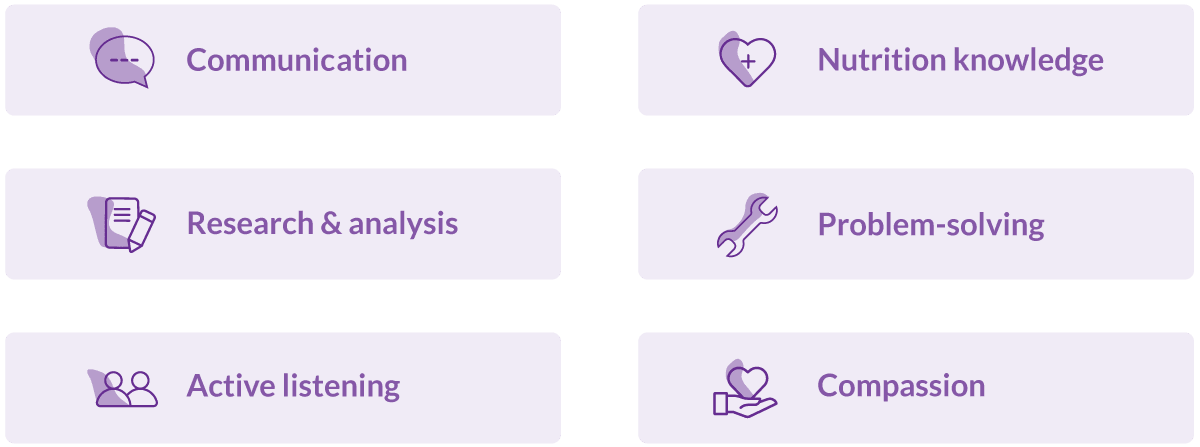In this post
So, You Want to Become a Nutritionist?
Published on August 25, 2020
It’s a great time to become a nutritionist in Australia. People are becoming increasingly aware of their health, seeing healthy eating as a vital puzzle piece. As a result, careers in nutrition have grown exponentially in the last five years, and the government predicts strong growth in the future. This makes it a fantastic career choice and one that can lead to many exciting opportunities.

Are nutritionists and dietitians the same?
While all dietitians are nutritionists in Australia, not all nutritionists are dietitians.
According to Nutrition Australia (NA), “Professional nutritional practice is not regulated by the government, and there is no legal protection over these terms.” This means that anybody can call themselves either a ‘nutritionist’ or a ‘dietitian’.
Both nutritionists and dietitians work to help people gain better health through dietary changes, “Only dietitians (with an accreditation from the Dietitians Association of Australia, or DAA) are qualified to provide medical nutrition therapy or clinical nutrition consultations,” says NA.
Nutritionists
Nutritionists primarily work in a preventative role, promoting good eating habits and a healthy lifestyle to help people maintain and improve their wellbeing. Their work includes giving practical nutrition advice, suggesting supplements, and helping clients with weight management.
To distinguish themselves in an unregulated industry, qualified nutritionists often choose to become Registered Nutritionists through the Nutrition Society of Australia. Registration shows prospective clients and employers that you have recognised credentials in human nutrition. Plus, it demonstrates that you meet industry standards for knowledge and continuing professional development.
Dietitians
Accredited Practising Dietitians (APDs) can treat illnesses in medical settings, like hospitals. They work alongside other health professionals, and doctors may refer patients to a dietitian. They can prescribe diet plans to help patients treat and manage conditions like diabetes, cancer, food allergies and intolerances. APDs are accredited by Dietitians Australia.
Because Medicare covers dietitian services under the Australian public health system, clinical dietitians often work with a wide range of people — not just people who can afford to go and see a nutritionist.
Do nutritionists get paid well?
Nutritionists are well-rewarded for their work. Full-time nutritionists take home $73,723 on average, and dietitians earn an average of $79,546 — putting both comfortably above the Australian median reported salary of $52,732. Dietitian in the public sector can be particularly lucrative, often bringing in six figures.
Part-time work is popular in this field. Around half of all nutrition professionals opt for part-time hours, allowing for flexibility and a healthy work-life balance.
nutritionist
$73,723
average salary
dietitian
$79,546
average salary
What are the qualifications to become a nutritionist?
If you want to study nutrition, you have plenty of options to choose from. There are a wide variety of nutrition courses available in Australia. Not all of them are called ‘Bachelor of Nutrition’, and their specialties vary from institution to institution. Nutrition courses focus on a core area of study — chemistry, biochemistry, physiology, and nutritional metabolism. Courses may also include food science and public health.
Core skills for nutritionists

How long does it take to become a nutritionist?
The average nutrition bachelor’s degree is between three and four years. Postgraduate courses are between one and two years, but most require you to complete a relevant undergraduate degree first.
Short and pathway courses
Want to get a taste for nutrition before you go all in? Taking a short course helps build your skills. You’ll see how nutrition fits into the broader healthcare sector, which can help you decide if you’d like to go for the full degree.
If you’re looking for a pathway into a university degree, consider completing a VET course first, like the Certificate IV in Allied Health Assistance (Nutrition and Dietetics). If you decide to go on and study a bachelor’s degree afterwards, your certificate or diploma may count for course credit.
Nutritionist qualifications
The most popular way to become a nutritionist is by completing a Diploma of Nutrition, or a bachelor degree, such as a Bachelor of Science, majoring in nutrition. You’ll need at least a bachelor-level degree to qualify for registration with the NSA. You can also qualify with a postgraduate degree, like a graduate certificate or diploma, a master’s degree, or a PhD in nutrition science.
Unaccredited courses are also available in areas like health coaching. Keep in mind that while these will develop your nutrition knowledge and enable you to become a nutrition coach, they aren’t comparable to a university degree and you won’t be able to become a Registered Nutritionist.
Dietitian qualifications
If you’re looking to become an accredited dietitian, you must complete at least a Bachelor-level course accredited by Dietitians Australia. Check their list of Accredited Dietetics Education Programs for more information.
Accredited courses are usually one of these qualifications:
- Bachelor of Nutrition and Dietetics
- Master of Dietetics
Pathway courses
Because entry criteria and prerequisites vary between institutions, you must check what applies to the courses you are interested in. Enquire about a particular course for more information.
What kind of careers can nutritionists have?
Once you have your nutrition qualifications, there are many careers to choose from. Nutritionists work in hospitals, government health departments, private practice, fitness centres, and in the food industry.
Typical careers include:
- Nutrition consultants and advisors
- Public health and promotion officers
- Community development officers
- Food technologists
- Quality and nutrition coordinators
- Researchers and research assistants
It’s important to note, however, that some of the above careers may require further study (e.g. researchers and health promotion). Make sure you take this into account when thinking about your career in nutrition.
Professional organisations
Once you have your nutrition qualifications, you can apply for membership with the Nutrition Society of Australia (NSA). Benefits of membership include automatic membership with the International Union of Nutrition Societies (IUNS), as well as networking opportunities.
Qualified nutritionists are also able to join the NSA Register of Nutritionists.
Other associations nutritionist graduates can be members of including the Public Health Association of Australia and the Australian Health Promotion Association.
Of course, if you want to add ‘accredited practising dietitian’ status to your resume, you may also apply to the Dietitians Association of Australia.
If helping others achieve health and wellness through food and nutrition sounds good to you, a career in nutrition may be what you are looking for.
Latest Articles
How to Apply for Work Placement: Tips & Resources
Congratulations! You’re about to embark on an exciting journey where you will practise and develop t...
11 Hobbies That Can Make You Money: Use Your Passion for Profit
Hobbies often get a bad rap. They’re seen as just a way to kill time, a mindless escape from t...
Is The Job You Hate Killing You? Why You Need to Make a Change
Do you hate your job? Studies show that staying in a job you hate has negative health effects and ev...
Want to read more?
Infographic: Highest Paying Science & Technology Jobs in Australia
If you’re considering a job in science and technology, you might be wondering, which science jobs pa...
Hairdressing Apprenticeship Guide: Everything you Need to Know
Have you ever considered becoming a hairdresser, but unsure exactly where to start? Read here about...
A Content Marketing Manager Shares: What’s Your Job Actually Like?
Explore what it’s actually like to be a content marketing manager with an industry insider, and disc...

